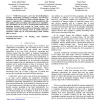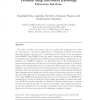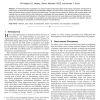253 search results - page 7 / 51 » How Can Computer Science Contribute to Knowledge Discovery |
110
Voted
CSE
2009
IEEE
15 years 6 months ago
2009
IEEE
— Visible Past proposes a new class of interdisciplinary learning, documenting, knowledge production, and discovery experiences that are anchored in space and time indicators. Th...
168
Voted
IDA
2011
Springer
14 years 9 months ago
2011
Springer
Ubiquitous Knowledge Discovery is a new research area at the intersection of machine learning and data mining with mobile and distributed systems. In this paper the main character...
102
Voted
DIS
2006
Springer
15 years 6 months ago
2006
Springer
Abstract. To the best of our knowledge, this paper is the first attempt to formalise a pragmatic logic of scientific discovery in a manner such that it can be realised by scientist...
139
Voted
FGCS
2010
15 years 1 months ago
2010
This paper describes our research effort to employ Grid technologies to enable the development of geoscience applications by integrating workflow technologies with data mining r...
145
Voted
TVCG
2012
13 years 5 months ago
2012
—A fundamental goal of visualization is to produce images of data that support visual analysis, exploration, and discovery of novel insights. An important consideration during vi...



